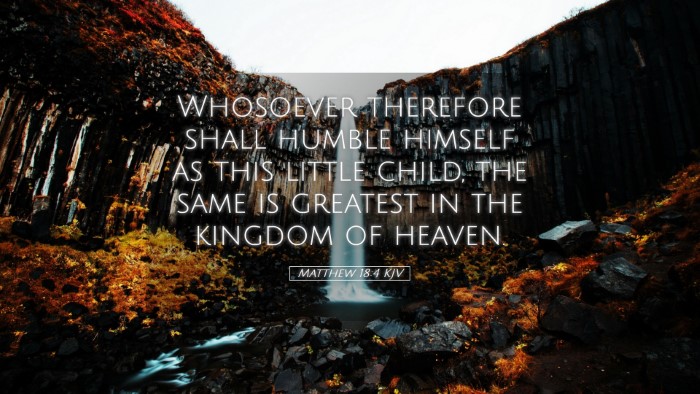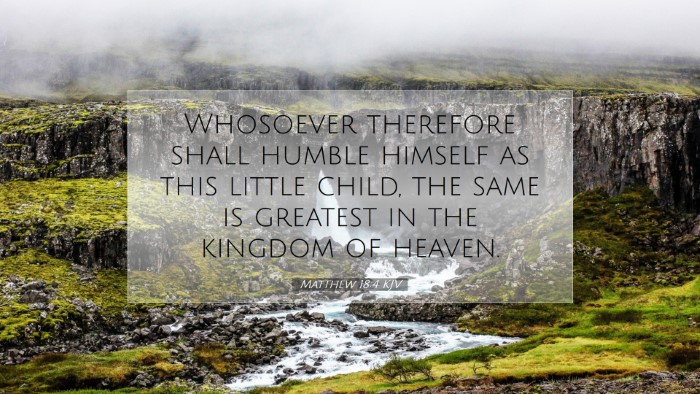Bible Commentary on Matthew 18:4
Verse: "Whosoever therefore shall humble himself as this little child, the same is greatest in the kingdom of heaven." (Matthew 18:4, KJV)
Introduction
This verse is a part of Jesus’ teachings about humility and greatness in the kingdom of heaven. It conveys profound insights into the nature of true greatness, juxtaposing the values of the world with the requirements of Christ's kingdom. Understanding this passage requires a comprehensive view of the cultural context and the biblical theme of humility.
Contextual Analysis
In the context of Matthew 18, the disciples seek to understand who among them is the greatest in the kingdom of heaven. Jesus responds by taking a child and placing them in their midst. By doing this, He emphasizes the necessity of humility for anyone desiring to be esteemed in His Kingdom.
Disciples’ Inquiry
The disciples' question reveals a common human tendency to seek recognition and status. Matthew Henry reflects on this by noting that their ambition is misguided; they fail to grasp the counterintuitive nature of Jesus’ kingdom.
Use of a Child
By bringing a child into the conversation, Jesus illustrates the qualities of humility and trust. Albert Barnes explains that children display an inherent humility, dependency, and a lack of self-assertion, which are essential traits for those in the kingdom. In biblical times, children had low social status, further underscoring the radical nature of Jesus' teaching.
The Essence of Humility
Adam Clarke elaborates on the term 'humble' as reflecting selflessness, an absence of pride, and an awareness of one’s limitations and need for God. Humbling oneself as a child involves relinquishing the pursuits of self-importance and embracing servitude.
Characteristics of a Child
- Trustfulness: Children inherently trust their caregivers and God, an essential aspect for believers.
- Open-heartedness: They possess a sincere willingness to embrace others, reflecting God’s love.
- Lack of Pretense: Children are genuine; their simplicity and honesty challenge adults to remove masks of sophistication.
Greatness in the Kingdom
Jesus defines greatness in stark contrast to worldly views. Matthew Henry aptly notes that true leaders in the kingdom are servants. Greatness does not derive from authority or accolades, but from one’s capacity to serve with humility.
Implications for Christian Leaders
For pastors and leaders, this passage serves as a strong warning against the allure of power and prestige. Albert Barnes highlights that those who seek to lead must first learn to serve, reflecting Christ's own example of servant leadership, illustrated through His actions throughout His ministry.
Theological Implications
In terms of theology, this verse invites deeper reflection on the nature of God’s kingdom. Adam Clarke posits that citizenship in the kingdom of heaven requires profound personal transformation—elevating the lowly and rejecting the proud.
Contrasting the Kingdom of God with the World
While the world may elevate the proud, the kingdom honors those who embody humility. Matthew Henry notes how God's kingdom operates on the principle of inversion—where the last are first and the humble are exalted.
Practical Applications
This verse offers several practical applications for believers today:
- Self-Examination: Regularly assess personal motives—are they rooted in humility or in desire for recognition?
- Emulating Childlike Faith: Cultivate trust in God and dependence on His provision.
- Service-Oriented Living: Seek opportunities to serve others, particularly those who are marginalized or in need.
Conclusion
Matthew 18:4 powerfully illustrates that true greatness in the eyes of God is fundamentally linked to humility. The teaching of Jesus challenges believers, prompting a reevaluation of attitudes and goals. In embracing humility like a child, Christians align themselves with the values of the kingdom of heaven, paving the way for greater service, deeper relationships, and authentic discipleship.


